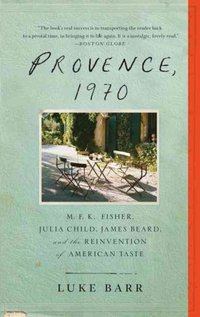There was a secret shared, and in time, the secret was widely shared. It was beautiful. Tasty and life-affirming, too. And many of us benefit from it every day of our lives.
Before 1970–give or take a few years either way–we ate frozen and canned foods, modern conveniences for the busy family. Fresh food wasn’t on the radar (and certainly not on the Radarange). Restaurants weren’t modern, not yet focused on locavores, or for that matter, shared cuisines beyond, say, a local pizza or Chinese restaurant.
What changed? Lots of cultural norms–greater awareness, shifted sensibilities, a focus on nutrition and fresh foods. This didn’t happen magically. It may have begun, in earnest, in 1970, when several iconoclasts gathered in nearby homes in the south of France. They changed the way we think about food, and if food is life, they changed the way we think about life, too.
They were Julia and Paul Child, whose rough contours were sketched in the film Julie & Julia. And, to a lesser degree, Simone Beck, who co-wrote “Mastering the Art of French Cooking” with Julia, and whose insistence upon classic French tradition emboldened Julia to think more clearly about the real world of American moms (few American dads cooked–except outdoors). There was the travel / food / free spirited writer M.F.K. Fisher and the American food expert James Beard, struggling through an extensive survey of our unique and sometimes inexplicable cuisine. And several others who cooked together, argued, and savory the good life that was making its way to Sonoma and Napa.
 Their story is told by Ms. Fisher’s nephew, Luke Barr in a book that’s becoming quite popular. It’s called Provence, 1970, and it provided a winter weekend’s entertainment. There are menus, and they lead into wonderful stories of friends building meals together– serious cooks experimenting and showing off for their foodie friends. It’s loose and informal, and I kept fantasizing about what it might have been like to join them, if just for a night. Few nonfiction books draw me into the story in quite this way, and it was fun to be a part of it, if only as an observer nearly fifty years later.
Their story is told by Ms. Fisher’s nephew, Luke Barr in a book that’s becoming quite popular. It’s called Provence, 1970, and it provided a winter weekend’s entertainment. There are menus, and they lead into wonderful stories of friends building meals together– serious cooks experimenting and showing off for their foodie friends. It’s loose and informal, and I kept fantasizing about what it might have been like to join them, if just for a night. Few nonfiction books draw me into the story in quite this way, and it was fun to be a part of it, if only as an observer nearly fifty years later.
It’s now available in paperback, but there’s something about the hardbound edition that’s even more appealing.
Enjoy!
BTW: The complete title is “Provence, 1970: M. F. K. Fisher, Julia Child, James Beard, and the Reinvention of American Taste.” Here’s an excerpt, courtesy of NPR.
 P.S.: I think I need to read more by M.F.K. Fisher. One intriguing title is a 1942 book called “How to Cook a Wolf.” I found a review of the book when it was new in the digital catacombs of The New York Times. They wrote:
P.S.: I think I need to read more by M.F.K. Fisher. One intriguing title is a 1942 book called “How to Cook a Wolf.” I found a review of the book when it was new in the digital catacombs of The New York Times. They wrote:
Mrs. Fisher writes about food with such relish and enthusiasm that the mere reading of her books creates a clamorous appetite. She also writes with a robust sense of humor and a nice capacity for a neatly turned phrase.”
[…] I want to go to Provence. In 1970. […]